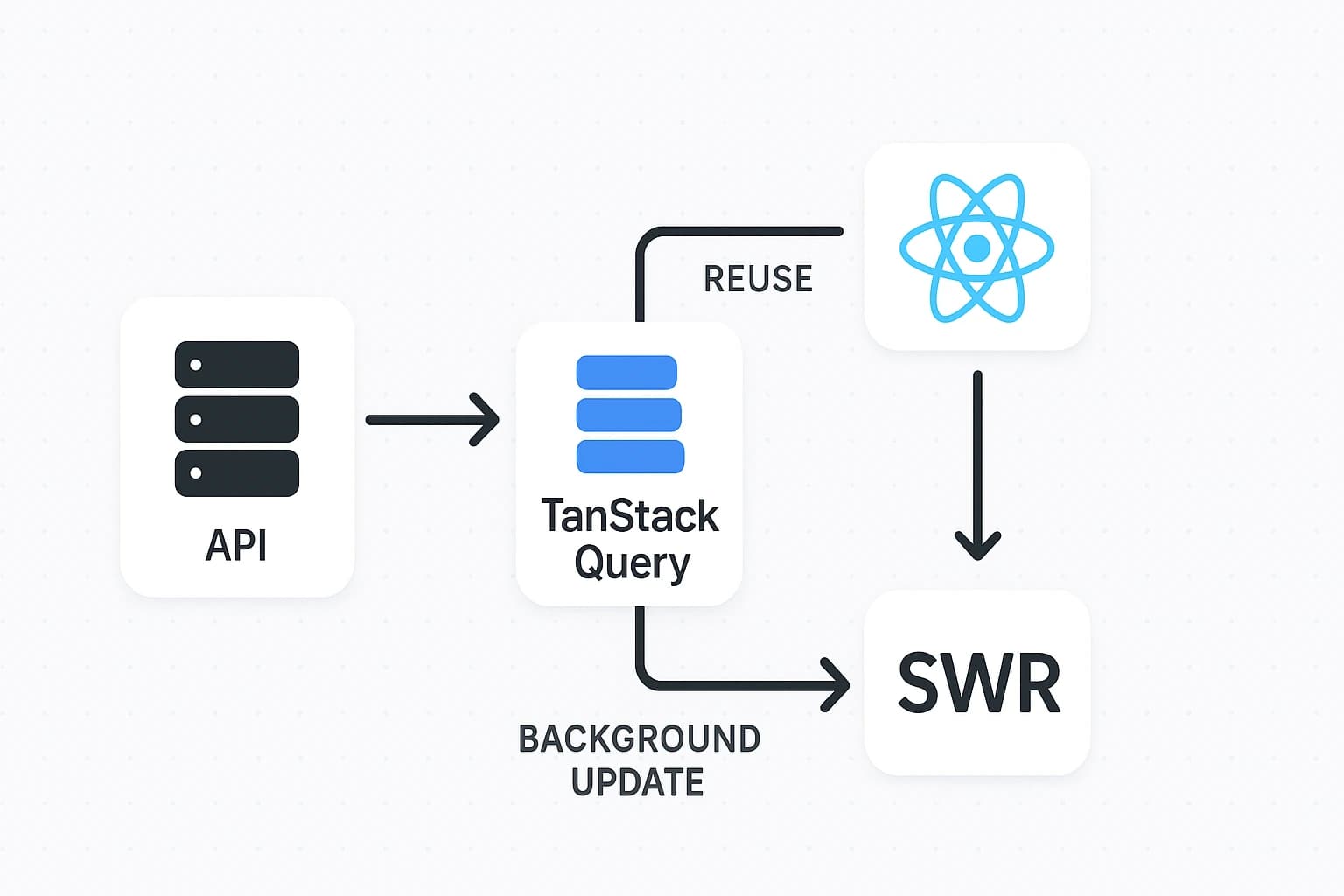Advanced React Data Fetching: Mastering Caching, Error Handling, and State Management
In the fast-paced world of React development, efficient data fetching is crucial for building high-performance web applications. At FAB Web Studio, we specialize in creating scalable React solutions that handle complex data needs seamlessly.

Whether you're developing a dynamic e-commerce platform or a data-driven dashboard, mastering advanced React data fetching techniques like caching, error handling, and state management can elevate your app from basic to brilliant.
This guide explores how to optimize data fetching in React, reduce API calls, manage errors effectively, and streamline state. All while ensuring a superior user experience. If you're ready to level up your React skills, read on. And if you need expert help implementing these strategies, contact our React development team at FAB Web Studio today.
Beyond Basic Fetch: Why Advanced Data Fetching Matters in React
Starting with React often means using the simple fetch() API in a useEffect hook:
This gets the job done for small projects, but as your React app scales, issues arise: redundant API requests, poor error recovery, inconsistent loading states, and data synchronization challenges across components.
Advanced React data fetching addresses these by incorporating caching for speed, robust error handling for resilience, and smart state management to avoid prop drilling.
React Caching Techniques: Reuse Data for Optimal Performance
Redundant data fetches slow down apps and waste resources. Caching in React stores fetched data locally, allowing quick reuse without repeated server hits—perfect for improving React app performance.
Benefits of Caching in React Apps
- Enhanced Speed: Instant data access from cache reduces latency.
- Cost Savings: Fewer API calls mean lower server costs.
- Offline Resilience: Cached data enables basic functionality without internet.
- App-Wide Consistency: Shared cache keeps data uniform across views.
Top Tools for React Caching
TanStack Query (Formerly React Query)
This powerful library handles fetching, caching, and syncing effortlessly. It includes automatic retries and background refreshes.
SWR from Vercel
Ideal for "stale-while-revalidate" strategies, SWR serves cached data immediately while updating in the background.

Ready to implement advanced caching in your React project? Hire our expert React developers for tailored solutions.
Error Handling in React: Building Resilient Data Flows
Networks fail, APIs glitch, and users encounter issues, robust error handling in React turns potential disasters into graceful recoveries.
Key Principles for Effective Error Handling
- User-Friendly Feedback: Display clear messages instead of blank screens.
- Automated Retries: Attempt refetches for transient errors.
- Logging and Monitoring: Track issues for quick fixes.
Using TanStack Query, error handling is built-in:
For app-wide protection, use React Error Boundaries with Suspense in React 18.
State Management in React: From Local to Global Without the Hassle
Fetched data needs a home. Poor state management leads to prop drilling and bloated code. Separate server state (from APIs) from local state (UI interactions) for cleaner apps.
Avoiding Common Pitfalls
Tools like TanStack Query provide a global cache, eliminating the need for props in many cases:
For local needs, stick with useState or useReducer. If complexity grows, consider Zustand.
Tackling CORS Issues in React Data Fetching
CORS in React errors often block third-party API requests. Configure server headers or use proxies in development to resolve them.
Integrating It All: A Streamlined React Data Fetching Workflow
Combine caching, error handling, and state for a flawless flow:
- Load cached data instantly.
- Handle errors with retries and messages.
- Manage state locally and globally.
- Sync updates in the background.
Example with TanStack Query:
Advanced Features: Pagination, Infinite Scroll, and Mutations in React
Go further with built-in support in libraries like React Query for paginated data, infinite scrolling, and mutations (e.g., form submissions). Use useMutation for optimistic updates:
Implementing Pagination
Pagination is ideal for splitting large datasets into manageable chunks, improving performance and user experience. React Query's useQuery hook supports paginated APIs by passing page numbers as query keys. Here's an example fetching paginated posts:
The keepPreviousData option ensures the previous page's data remains visible while fetching the next page, preventing UI flicker. The API is assumed to return { posts, hasNextPage } for navigation.
Implementing Infinite Scroll
Infinite scroll loads data as the user scrolls, perfect for social media feeds or long lists. React Query's useInfiniteQuery handles this by managing page groups. Here's an example:
This uses the Intersection Observer API to trigger fetchNextPage when the last post is visible. The getNextPageParam function determines the next page number based on the API's hasNextPage response. Ensure your API returns { posts, hasNextPage } for compatibility.
Best Practices
- Pagination: Use keepPreviousData for smooth page transitions and handle edge cases like empty pages or invalid page numbers.
- Infinite Scroll: Optimize performance by debouncing scroll events and using Intersection Observer instead of scroll listeners. Clean up observers to prevent memory leaks.
- Mutations: Combine with useMutation to update data (e.g., liking a post) and invalidate queries to keep the UI in sync.
These implementations leverage React Query to simplify state management, reduce boilerplate, and enhance performance for a seamless user experience.
Elevate Your React Apps with Expert Data Fetching
Data fetching is the core of modern React applications. Done right, it creates responsive, reliable experiences that drive user engagement. At FAB Web Studio, we turn these concepts into reality for startups and SMBs worldwide.
Ready to Optimize Your React Project?
Don't settle for basic fetches—partner with us for cutting-edge solutions. Schedule a free consultation or hire top React developers today. Let's build a faster, smarter web app together!
Latest Posts

Stop Missing Deadlines: A Practical Guide for Software Engineers
Abhishek Bhardwaj
Feb 11, 2026

Unlocking Growth with Shopify Apps
Parteek Dhawan
Jan 19, 2026

React & Next.js Best Practices in 2026: Performance, Scale & Cleaner Code
Abhishek Bhardwaj
Jan 16, 2026

How AI & Automation Are Changing Modern Websites in 2026
Parteek Dhawan
Jan 14, 2026

Full-Stack Trends in 2026: Powering Your Digital Products
Abhishek Bhardwaj
Jan 12, 2026
![[object Object] profile picture](/_next/image?url=https%3A%2F%2Fres.cloudinary.com%2Fdkdsxusqu%2Fimage%2Fupload%2Fv1758892467%2FAbhishek_Bhardwaj_2676d1f01d.webp&w=128&q=75)